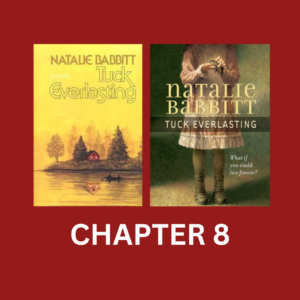
Winnie did not believe in fairy tales. She had never longed for a magic wand, did not expect to marry a prince, and was scornful—most of the time—of her grandmother’s elves. So now she sat, mouth open, wide-eyed, not knowing what to make of this extraordinary story. It couldn’t—not a bit of it—be true. And yet:
“‘It feels so fine to tell somebody!’ Jesse exploded. ‘Just think, Winnie Foster, you’re the only person in the world, besides us, who knows about it!’
“‘Hold on now,’ said Miles cautiously. ‘Maybe not. There might be a whole lot of others, for all we know, wandering around just like us.’
“‘Maybe. But we don’t know them,’ Jesse pointed out. ‘We’ve never had anyone but us to talk about it to. Winnie—isn’t it peculiar? And kind of wonder ful? Just think of all the things we’ve seen in the world! All the things we’re going to see’
“‘That kind of talk’ll make her want to rush back and drink a gallon of the stuff,’ warned Miles. ‘There’s a whole lot more to it than Jesse Tuck’s good times, you know.’
“‘Oh, stuff,’ said Jesse with a shrug. ‘We might as well enjoy it, long as we can’t change it. You don’t have to be such a parson all the time.’
“‘I’m not being a parson,’ said Miles. ‘I just think you ought to take it more serious.’
“‘Now, boys,’ said Mae. She was kneeling by the stream, splashing her face and hands with cool water. ‘Whew! Such weather!’ she exclaimed, sitting back on her heels. She unfastened the brooch, took off her shawl, and toweled her dripping face. ‘Well, child,’ she said to Winnie, standing up, ‘now you share our secret. It’s a big, dangerous secret. We got to have your help to keep it. I expect you’re full of questions, but we can’t stay here no longer.’ She tied the shawl around her waist then, and sighed. ‘It pains me to think how your ma and pa will worry, but there’s just no way around it. We got to take you home with us. That’s the plan. Tuck—he’ll want to talk it out, make sure you see why you can’t tell no one. But we’ll bring you back tomorrow. All right?’
“And all three of them looked at her hopefully. ‘All right,’ said Winnie. For, she decided, there wasn’t any choice. She would have to go. They would probably make her go, anyway, no matter what she said. But she felt there was nothing to be afraid of, not really. For they seemed gentle. Gentle and —in a strange way—childlike. They made her feel old. And the way they spoke to her, the way they looked at her, made her feel special. Important. It was a warm, spreading feeling, entirely new. She liked it, and in spite of their story, she liked them, too—especially Jesse.
But it was Miles who took her hand and said, ‘It’s really fine to have you along, even if it’s only for a day or two.’
“Then Jesse gave a great whoop and leapt into the stream, splashing mightily. ‘What’d you bring for breakfast, Ma?’he cried. ‘We can eat on the way, can’t we? I’m starving!’
So, with the sun riding high now in the sky, they started off again, noisy in the August stillness, eating bread and cheese. Jesse sang funny old songs in a loud voice and swung like a monkey from the branches of trees, showing off shamelessly for Winnie, calling to her, ‘Hey, Winnie Foster, watch me!’ and ‘Look what I can do!’
And Winnie, laughing at him, lost the last of her alarm. They were friends, her friends. She was running away after all, but she was not alone. Closing the gate on her oldest fears as she had closed the gate of her own fenced yard, she discovered the wings she’d always wished she had. And all at once she was elated. Where were the terrors she’d been told she should expect? She could not recognize them anywhere. The sweet earth opened out its wide four corners to her like the petals of a flower ready to be picked, and it shimmered with light and possibility till she was dizzy with it. Her mother’s voice, the feel of home, receded for the moment, and her thoughts turned forward. Why, she, too, might live forever in this remarkable world she was only just discovering! The story of the spring—it might be true! So that, when she was not rolling along on the back of the fat old horse—by choice, this time— she ran shouting down the road, her arms flung out, making more noise than anybody. It was good. So good, in fact, that through it all, not one of them noticed that the man they had passed on the road, the man in the yellow suit, had crept up to the bushes by the stream and heard it all, the whole fantastic story. Nor did they notice that he was following now, beside the road far behind, his mouth, above the thin, gray beard, turned ever so slightly toward a smile. Babbitt, Tuck, pgs. 42-45.
Discover more from Jacki Kellum
Subscribe to get the latest posts sent to your email.